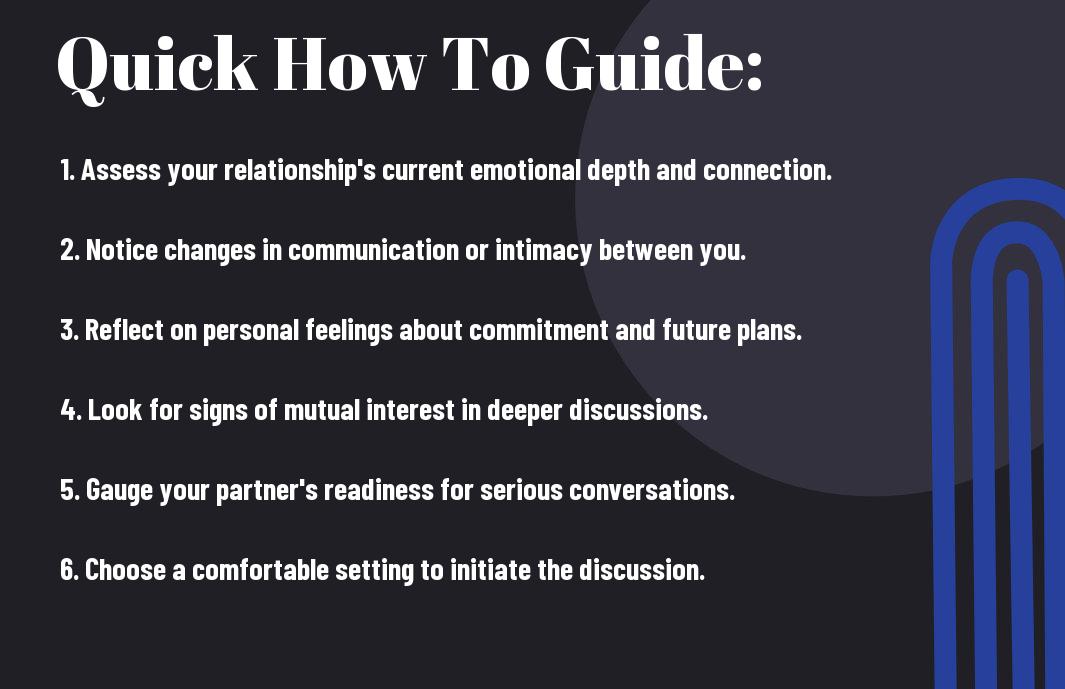Relationships can be challenging, especially when it comes to discussing the important topics that shape your future together. Understanding when to initiate ‘The Talk’ about your relationship status, feelings, and long-term goals is key to building a strong connection. You might find yourself wondering if the time is right, and in this guide, we’ll explore the signs that indicate when it’s necessary for you to have that conversation. By recognizing these cues, you’ll be better equipped to navigate the complexities of your relationship with confidence.
Recognizing the Signs
The journey of any relationship involves various indicators that suggest it might be time to have ‘The Talk’. Pay attention to changes in communication patterns, emotional intimacy, and your level of comfort around each other. If you find yourself frequently discussing the future or if your relationship feels stagnant, these may be signs that the conversation is necessary for growth and clarity. Trust your instincts, as they often lead you to understand when it’s time to take this important step forward.
Identifying Relationship Milestones
Little moments in your relationship can signify significant progress, such as meeting friends and family, shared experiences, and discussions about future plans. These milestones help establish a foundation for deeper commitment. If you notice that you and your partner are consistently reaching these milestones together, it may indicate that your relationship is evolving and that ‘The Talk’ is on the horizon.
Assessing Emotional Readiness
With emotional readiness comes a sense of security and comfort in your relationship. Evaluate your feelings and those of your partner; if you both express a desire for deeper commitment, it may be the right time to engage in a meaningful conversation. Open communication about your feelings is imperative in ensuring that both of you are aligned in your relationship goals.
This emotional readiness involves being open and honest with yourself about your desires and concerns. You might consider how you would feel if your partner were to define your relationship, or if you’ve had persistent thoughts about taking the next step. Recognize that your emotional state plays a vital role in how the conversation will unfold. Approach the situation with mindfulness and ensure that both you and your partner are emotionally prepared for the potential changes in your relationship dynamic.

The Right Timing
Even though discussing important topics can be challenging, finding the right moment can make all the difference in how the conversation goes. Timing can impact your partner’s receptiveness and the overall effectiveness of your discussion. Pay attention to your partner’s mood, the dynamics of your relationship, and avoid times of high stress or distraction to ensure a fruitful dialogue.
Factors to Consider
To choose the right moment for ‘The Talk’, consider several important factors:
- Your partner’s current emotional state
- Recent events in your relationship
- The environment and distractions around you
Any other factors that may affect the mood can also play a role, so stay attentive.
Choosing the Appropriate Setting
For a meaningful conversation, the setting is just as important as the timing. Ensure you are in a comfortable, private location where you can speak openly and honestly without interruptions or distractions.
It often helps to select a familiar place that you both enjoy, as this can ease tension and promote a more relaxed atmosphere. Avoid crowded or noisy locations, and instead aim for a quiet evening at home or a stroll in a peaceful park. A calm environment encourages a productive conversation, allowing both of you to express your thoughts and feelings with clarity and respect.
Preparing for ‘The Talk’
Unlike casual conversations, preparing for ‘The Talk’ requires thoughtful consideration and clarity. You should approach this discussion with a clear understanding of your feelings and intentions. Set aside a quiet time and place where you can talk without interruptions, ensuring both you and your partner feel comfortable. Your preparation may include outlining your key points and anticipating possible outcomes of the conversation to foster a constructive dialogue.
Key Points to Address
Any significant conversation should lay out the key points you want to discuss, such as relationship goals, boundaries, and expectations. Identify what is important to you and think about how to express these thoughts clearly. This ensures that both you and your partner are on the same page and reduces the risk of misunderstandings.
Anticipating Reactions
Even when you prepare well, it’s necessary to consider how your partner may respond during ‘The Talk’. Each individual has different emotional triggers and communication styles that could affect the outcome of your conversation. Understanding and anticipating their potential reactions can help you steer the discussion in a way that maintains respect and openness.
Plus, being prepared for various reactions can empower you to remain calm and composed. By considering how your partner might feel—be it surprised, defensive, or relieved—you can adjust your approach accordingly. This anticipatory mindset can help facilitate empathetic dialogue, allowing you to navigate the conversation more effectively and foster a better understanding between you both.

Tips for Effective Communication
After you’ve decided to have ‘The Talk’, it’s crucial to communicate effectively for a productive conversation. Here are some tips:
- Choose a comfortable setting.
- Be clear and direct about your feelings.
- Ask open-ended questions.
- Stay focused on the topic at hand.
The goal is to create an atmosphere where both parties can express their thoughts freely.
Using Active Listening
Some of the most effective communication happens when you practice active listening. This means truly being present and engaged during the conversation. Make sure to nod, maintain eye contact, and refrain from interrupting your partner as they speak. By doing so, you will not only understand their perspective but also demonstrate that their feelings are valued.
Maintaining a Calm and Open Dialogue
Communication is more successful when you maintain a calm and open dialogue. This involves staying composed and being receptive to your partner’s feelings and viewpoints, even if they differ from your own.
Another key aspect is to take a step back if the conversation gets heated. Allow space for both of you to cool down, and then reconvene when emotions are less intense. Encourage your partner to share their feelings openly, while you practice patience and empathy. This creates a safe space and makes it easier for both of you to address sensitive topics without hostility.
Handling Outcomes
Now that you’ve had ‘the talk’, it’s imperative to handle the various outcomes with care and understanding. This conversation can lead to different emotional responses, and how you manage these will affect your relationship moving forward. You should be prepared for reactions that range from acceptance to surprise or even denial. Each response is valid, and how you choose to engage will determine the next steps in your journey together.
Navigating Different Reactions
There’s no one-size-fits-all reaction to your conversation. Your partner may feel overwhelmed, relieved, or uncertain about what comes next. It’s important to validate their feelings and provide space for open dialogue. Encourage them to express their thoughts and concerns, as this can help both of you process the discussion more effectively.
Creating a Follow-Up Plan
Assuming the conversation has opened new avenues, developing a follow-up plan is imperative for maintaining progress. This plan should include regular check-ins to discuss feelings, goals, and any changes that may arise, ensuring you both stay aligned moving forward.
Understanding that the initial conversation is just the beginning can help reinforce your bond. Regular communication allows you to revisit and reshape your expectations as your relationship evolves. A follow-up plan serves as a framework for mutual growth, ensuring both you and your partner feel heard and supported in your changing dynamics. Incorporate agreed-upon checkpoints to assess how things are progressing, and don’t hesitate to adjust the plan as necessary to foster a healthy relationship.
Common Challenges
To effectively navigate the conversation, you should be aware of common challenges that may arise. Many individuals grapple with fear, anxiety, and uncertainty about how the talk may impact their relationship. Additionally, the dynamics between you and your partner can complicate matters further, necessitating a tailored approach to ensure clarity and mutual understanding.
Overcoming Fears and Anxiety
Little fears and anxieties can often create barriers to having ‘the talk’. Acknowledge that feeling uneasy is normal, and allowing yourself to explore these emotions can empower you to address them directly. Prioritize open communication and practice what you want to say in advance, helping to bolster your confidence.
Managing Different Relationship Dynamics
Some relationships come with unique challenges that require careful consideration when broaching sensitive topics. Your connection with your partner, whether it’s new or long-established, significantly influences how you approach these discussions. Tailoring your conversation style to fit the dynamics will foster a more productive dialogue.
Understanding how different relationship dynamics play a role in your talk can enhance your effectiveness. If you’re in a long-term relationship, you may need to reflect on shared history and mutual expectations, while newer connections may require a more straightforward approach. Assess the emotional climate of your relationship to gauge what language and timing will resonate best. A thoughtful strategy can increase the chance of a successful, open conversation.
Final Words
The decision to have ‘The Talk’ in your relationship is imperative for its growth. Pay attention to your feelings and the signs your partner may be ready for a deeper conversation. When you find yourselves repeatedly discussing the future or experiencing heightened emotions, it’s a clear indicator that you should initiate the dialogue. Timing is key, so choose a moment when you’re both relaxed and open. By taking this step, you’re paving the way for greater understanding and connection between you and your partner.










